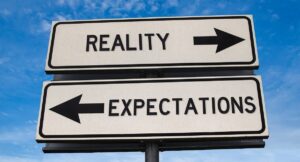Interviews: Focus on the employer’s needs to win this game
It’s surprising that many people still rely on their resume to tell their story for them. They spend little time preparing for an interview. The old-school thinking: my resume will get me in the door and once there, I’ll wing it, is no longer effective. Being the slickest candidate isn’t going to work. Although preparing your answers for the most frequently asked interview questions is a good start, you won’t make it to the final rounds if you provide generic responses. You need to know the context of the role you’re pursuing to be able to speak to their specific needs. Your focus needs to be on the employer to win this game.
Context covers many things.
So, to get started, let’s talk about context. A job’s context covers many things. It includes reporting structures, specific deliverables, and how the role contributes to the organization’s mission. Context includes team dynamics, functions, communication styles, potential partnering teams or collaborative relationships, and anticipated work hours or schedules. Overall, you’re looking for what you need to produce and how your work impacts the team’s success. To do that, you need to know about the people you’ll be working with and how you’ll interact with them. Meeting for the first time during an interview is never enough time to learn everything. Unless you’ve done the research, they will know much more about you than you know about them.
Applying for posted jobs without knowing the context puts you at a disadvantage during the interview. It can also put you in a weak position when you accept the offer. Descriptions can be limited and sometimes entirely inaccurate. It’s not uncommon for HR/recruiters to “borrow” descriptions of similar positions they’re attempting to fill in their haste to get them posted. They may not have had conversations with the hiring managers to learn more about their specific needs before they post the job. Working with limited information can prevent you from providing relevant examples during the interview. This can keep you from commanding top dollar when they are considering your value.
Know what the expectations are.
It’s also critical for everyone involved to know what the expectations are right from the start. It’s common for an employer to remain vague about their expectations during the interview process. But you need to why the requested skills and experience are essential to your success in the job. Granted, sometimes they’re not. But you’ll stand a greater chance of being selected (and happy) if you completely understand the actual functions of the role. Often times, they may be very different than the job posting indicates.
You can pass an initial screening when you’ve added the right keywords to your resume and sound convincing on the phone. The screener may be unaware of how critical specific skills are to getting the job done. Unfortunately, their lack of awareness can result in a colossal waste of time when the truth about your competency surfaces. Even if you think you can learn things quickly, the context of the position will provide clues as to whether it is even possible. Without that information you’re shooting in the dark.
Don’t assume.
Don’t assume you’ll be allowed the time to learn critical functions. Don’t also assume that the employer has an established process for training. To be clear, I don’t mean you should avoid reaching for jobs when you are less than a 100% match. But I do recommend that if you fall short in any way, you completely understand the functions of the role, the expected outcomes, and how shortcomings will impact the results the employer needs. If you’re missing 20% of the skills that impact critical baseline functions, then everyone needs to know how much time it will take to get you up to speed. Consider if it’s practical or realistic to expect the employer to invest in teaching you a fundamental skill for a role they need to fill right now.
Posted requirements and qualifications can be minimally relevant.
 The frustrating part of this is that the posted requirements and qualifications can be minimally relevant to the functions of a role. The screener may overlook relevant experience or skills because the words they’re looking for are not in your resume. They won’t recognize your transferable skills unless they completely understand the job’s functions. In these cases, even prepared answers to the usual interview questions will fall flat if your description of your prior work is not translated into how your experience matches this employer’s needs.
The frustrating part of this is that the posted requirements and qualifications can be minimally relevant to the functions of a role. The screener may overlook relevant experience or skills because the words they’re looking for are not in your resume. They won’t recognize your transferable skills unless they completely understand the job’s functions. In these cases, even prepared answers to the usual interview questions will fall flat if your description of your prior work is not translated into how your experience matches this employer’s needs.
To be able to relate effectively, you need to know exactly what the employer does or produces, how this role supports their mission and what it takes to get that job done. A posted job description may cover only the bare minimum of this information. If you have already applied for a job, a call for an interview could come immediately. Waiting until after you apply to learn more may be too late.
Do comprehensive research.
You might be thinking: how in the world can I find out what an employer really needs? The answer is to do comprehensive research. You can start by learning about the industry. From there, learn as much as possible about the employer. Have conversations with current or past employees and ask open-ended questions. Examples would be “How would you describe the culture at XYZ company?” or “Tell me why you chose to work for XYZ company?” You can talk with people who work for competitors to get a sense of the company’s standing in the market. Finally, you can learn as much as possible about the specific role by talking with people in the same department before you apply.
The method I’m describing is a proactive search. It involves targeting and researching organizations long in advance of applying. It typically produces more satisfying results than a passive search (pursuing random, posted positions without background information.) Internet research will yield a considerable amount of relevant information to start. But talking to real people who actually perform the same type of work will offer the most useful information. It is also helpful to speak directly with others who work in different departments to learn about the culture and internal structures. Another resource is former employees. They will help you to understand what you would be signing on to.
Understand whether you’re competitive.
Fully understanding what a company needs and wants will help you to be realistic about whether you’re qualified for a role or a fit with their culture. Simply wanting the job (or the compensation that comes with it) isn’t enough. Knowing the market, which skills are in demand, and the supply of talent available to an employer will help you understand whether you’re competitive or if pursuing a role is worth your time. You’re more likely to hit your goal using a proactive search than spraying resumes at a million job postings.
There are many ways to help ensure your next interview results in an offer. Simply put, it requires research and preparation. Stay focused on what the employer needs and be able to deliver it. It all comes down to how much time you are willing to invest upfront to get the results you desire in the end.
For more career advice, check out my webinars on Unbeatable Interviewing Techniques, Strategic Networking & Informational Interviewing and follow me on LinkedIn and Twitter.









